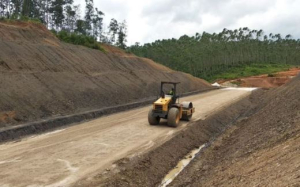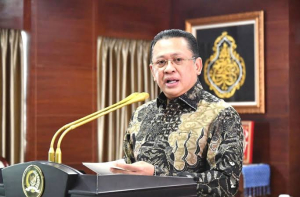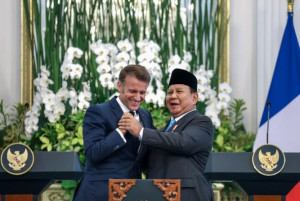Supporters seek extension of Jokowi's presidential term
President Joko "Jokowi" Widodo's supporters are looking for a leeway to extend the presidential term by 2 or 3 years in office by delaying the 2024 General Elections. A source inside the Office of Presidential Staff (KSP) said the extension of Jokowi's tenure would be a more logical choice rather than allowing him to run for the third term in office, which was against the Constitution.
"[By delaying the elections] it is automatically Jokowi [remains as president]. It will take an election [to allow him to run for] the third period and the government should spend money [for an election]. By extending the presidential term, Jokowi will stay in power for two to three years," the source told Indonesia Business Post on December 24, 2022.
Read also: Jokowi supporters push for third term in office
Previously, Jokowi's supporters has tried to push his third term at office, although the Constitution states that the presidential term is limited to two consecutive terms only.
Pandemic impact and possible economic crisis
The source argued that it was not Jokowi's will to extend his term in office but foreign parties, including European nations, as Indonesia would be impacted by possible global economic crisis in 2023. "Then in 2024 we buy a pig in a poke? Suddenly there will be a big trial and the [new] president has no experience. Then we bite our fingers," the source said.
The source explained that in a normal situation, the presidential term in the office was 5 years. In the first half of his first year, the president learns and explores his job. It is the same as the last half of the year of his presidency. Effectively, Indonesian president works for only 4 years.
During Jokowi's second term in office, the country, as well as the world, was hit hard by the COVID-19 pandemic. Therefore, he only worked effectively for 2 years. Most of the State Budget had been spent to deal with the pandemic. The source said it was not fair for someone as great as Jokowi, who handled the pandemic well, did not receive appreciation by continuing his term in office.
"One of the priorities is to prevents big projects, especially the relocation of the new state (IKN) from stalling," the source pointed out.
Read also: Constitutional Court rejects petition to annul new capital law
Constitution amendment
The source said that Jokowi's supporters have consolidated and mobilized supports to voice their demand on the postponement of the elections. The original plan was gathering the supporters in front of the People’s Consultative Assembly (MPR) compound, urging the MPR members to amend the Constitution to delay the elections. After Jokowi's presidency, the amendment can be revoked. "The people will force the MPR to support it [the demand]," he explained.
Currently, there has been ongoing negotiation with political parties in the MPR on what will they get from the extension of Jokowi's term in the office. "This is what they will get: The compensation for political parties. What they want is what they get," the source said, adding that if Jokowi's presidential term was extended, the tenure for MPR and the House of Representatives (DPR) members would also be extended.
Previously, MPR Speaker Bambang Soesatyo praised Jokowi’s administration, saying the president has been successful in dealing with the pandemic, holding the G20 Summit and creating 5% economic growth. Jokowi, he said, also had quick responses on earthquakes and disasters that occurred in several areas of Indonesia.
“In my assessment, Jokowi has a sense of crisis. The public satisfaction may have correlation with Jokowi’s longer leadership or they are already satisfied with his current performance,” he said.
Soesatyo said Indonesia was facing a big agenda in the next 2 years, which was the simultaneous general elections. Indonesia should take the elections seriously since it usually increases political tensions. “We need to calculate whether the momentum is right in this era because we are doing a recovery on this situation and anticipate global threat in the economy and natural disasters,” he added.
How to extend presidential term?
Expert on Constitutional Law Refly Harun said there was no clause in the Constitution to extend the presidential term or allow the president to run for office for the third period. "It is a treason against the Constitution," he said.
According to Harun, the people could question the presidential term extension or even a third presidential period as the ideas are against the Constitution. The existing Constitution only stipulates the presidential term for two periods, which is the result of the 1998 reform era. "Therefore, the presidential term extension or a third presidential period is unconstitutional," he said.
Prior to the reform era, former authoritarian Soeharto raised to power from 1967 to his downfall in 1998, serving nearly 7 presidential periods.
Read also: Polarization, identity politics continue to threaten democracy in 2024 general elections
The Regional Representative Council (DPD) Speaker La Nyalla Mattalitti has proposed for a return to the original version of the 1945 Constitution, which did not limit the presidential term, as in the case of Soeharto.
According to him, there are two instruments to return to the original version of the 1945 Constitution. First, the instrument is the power of the MPR, which can make and change the constitution. "It should be based on the MPR decree [to amend the Constitution]," Mattalitti said.
Second, the instrument is a presidential decree that has the characteristic as post factum. If the presidential decree is supported by social political power, such as the military and the people, the decree can be a new legal order. "It is impossible for a president to issue a decree without the endorsement from social politic power, if there is no guarantee from the military," he added.
If the presidential decree is not supported, the president can be impeached because he has violated the Constitution and conducted despicable act.
Political Analyst from the Pelita Harapan University, Emrus Sihombing, said the Jokowi's presidential term extension and the postponement of the 2024 elections would will be rejected by the majority of the people.
"The people of Indonesia love constitutional democracy," he added.
Already have an account? Sign In
-
Start reading
Freemium
-
Monthly Subscription
20% OFF$29.75
$37.19/MonthCancel anytime
This offer is open to all new subscribers!
Subscribe now -
Yearly Subscription
33% OFF$228.13
$340.5/YearCancel anytime
This offer is open to all new subscribers!
Subscribe now







